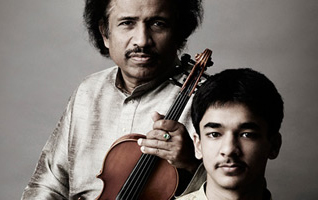by Mike Telin

On Friday, October 4 at 7:30 p.m. in Gartner Auditorium at the Cleveland Museum of Art, L. Subramaniam will be joined by his son Ambi Subramaniam and percussionist Mahesh Krishnamurthy for a program of South Indian Carnatic music. Sonya Rhie Quintanilla, the George P. Bickford Curator of Indian and Southeast Asian Art, will preview the reopening of the Indian and Southeast Asian galleries with a pre-concert talk beginning at 6:00 p.m.
Subramaniam is an enthusiastic, engaging and thankfully patient conversationalist as he tells me that Indian classical music is melodically complex and that improvisation plays a major role in performance. He continues to explain that Friday’s concert of South Indian Carnatic music will consist of compositions based on ragas in different forms. One of the forms is Kriti, which consists of three sections based on a raga. At the end of each section they will return to the first line after which they will improvise on the line of the raga on which the Kriti is based.
Subramaniam continues to explain that even though a raga is based on a scale, and there are 72 parent scales, there are additional scales derived from those. “When we say we are playing a raga, we have to know the primary notes of the scale and emphasize those primary notes when we improvise. Some Ragas have microtones, and we try to bring out the flavor, color and emotion and spirituality of the music. We try to bring all of those factors into the improvisation on a raga even though it is based on a scale.”
72 parent scales? “But derived from that we have close to a million scales. When I say million I am not exaggerating,” he says, laughing. “We study the principals of those 72 scales then the derived scales. Even now many are being discovered and some do not even have names. In Indian music the more important thing [to know] is that it is passed on in an oral tradition.” He laughs, thank goodness, when I tell him that I was happy to know the tradition was passed down orally, because a book that contains a million scales must be really big. “Oh please, it is just a different system, but no, you will never see or at least you shouldn’t see an Indian musician playing with the book. It is all by memory and you learn from your guru. My father was my guru and my son is my disciple. And ear training is the most important part of the training. You must learn to listen to the microtones and the ornamentation.”
How did L. Subramaniam find his way into Western music? “In my case I went to California to study Western classical composition. My intention was to learn and to write compositions incorporating harmony with these [Indian] scales. So combining Western harmony with the ragas has been my focus.”
It was during the late 1970’s and into 80’s that he was approached by orchestras asking him to collaborate. “At that time orchestras didn’t have any concertos for Indian violin so they asked me to write some. So I wrote for the New York Philharmonic, London Philharmonic and orchestra in Oslo and Moscow. I ended up writing a lot and they became very well-known among different orchestras. And now I have performed with orchestra close to 170 times.”
He says it has been a privilege to play with people like Yehudi Menuhin. “When I was asked to perform at the United Nations they asked Menuhin and me to each perform separately but Menuhin asked me if I would write a piece for us to play together. Which I did.”
Subramaniam has also written pieces for and performed with jazz greats Stephane Grappelli, Herbie Hancock, Stanley Clarke, George Duke, Joe Sample, Stanley Clarke, George Jean Luc Ponty, Maynard Ferguson and Ravi Coltrane. He says that many of them have come to India to perform at his Lakshminarayana Global Music Festival, the biggest global music festival in India. “So yes, I do play Indian classical but I have also worked with many musicians who come from the improvisation tradition. All of this has brought me a lot of pleasure and many fond memories. All of these experiences have enriched my knowledge of music.”
He has composed music for a select few films, but he says that he almost turned down his first job offer. “My older brother was doing a lot of film work in India at that time so I said that he would be the better person, but they insisted that I do it. And my first wife also insisted that I do it, so that is how I first got involved. So that led to Mississippi Masala with Denzel Washington, then one by one people started asking me to do more films.” He says that if he was free he did it.
How has Subramaniam been spending his free time between tours? “I’ve just finished mixing an album that features ten jazz greats, like Stephane Grappelli — the last piece I recorded with him before he died — Herbie Hancock, George Duke, Charlie Clarke, Jean Luc Ponety and Hubert Laws. I hope it will be out next year.”
Published on ClevelandClassical.com October 1, 2013
Click here for a printable version of this article.



